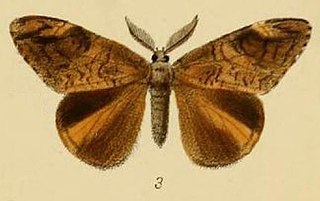Kuja is a genus of African moths of the family Thyrididae.

The suni is a small antelope. It occurs in dense underbrush from central Kenya to KwaZulu-Natal in South Africa.

The Catocalinae are a subfamily of noctuoid moths, placed in family Noctuidae. In the alternative arrangement, where the Noctuidae are reduced to the core group around the Noctuinae, the present lineage is abolished, the upranked Catocalini being merged with the Erebini and becoming a subfamily of the reestablished family Erebidae.

Imma is a large genus of moths in the obtectomeran "micromoth" family Immidae. This is the type genus of its family. They are widespread in the tropics, with most species occurring between the Himalayas and the Oceanian region; the genus is furthermore plentiful in the Neotropics, but not very diverse in the Afrotropics.
Tinoliodes is a genus of tiger moths in the family Erebidae described by Wileman in 1915.
Trichaetoides is a genus of moths in the family Erebidae erected by Jeremy Daniel Holloway in 1988.

Eoophyla is a genus of moths of the family Crambidae. It was erected by Charles Swinhoe in 1900.

Plecoptera is a genus of moths of the family Erebidae. It was described by Achille Guenée in 1852.
Sarobela is a monotypic moth genus of the family Erebidae described by Turner in 1936. Its only species, Sarobela litterata, was first described by Pagenstecher in 1888. It is found in Sri Lanka, Hong Kong, the Philippines, Taiwan, Myanmar, the Andaman Islands, Sumatra, Sulawesi, New Guinea, Borneo and Australia.

Aroa is a genus of moths in the subfamily Lymantriinae first described by Francis Walker in 1855. Species are distributed in South Africa, China, throughout India, Sri Lanka, Myanmar, and Java.
Pantana is a genus of tussock moths in the family Erebidae. The genus was erected by Francis Walker in 1855.

Dysphania is a genus of colourful moths in the family Geometridae and typical of the tribe Dysphaniini; they are sometimes called 'false tiger moths' and are found in northeast Australia, Melanesia, and south, east and southeast Asia.

Teldenia is a genus of moths belonging to the subfamily Drepaninae.

Dactyloceras is a genus of moths of the family Brahmaeidae.

Choreutis is a genus of moths in the family of metalmark moths (Choreutidae), and therein to subfamily Choreutinae. Of these, it is the type genus. The genus was described by Jacob Hübner in 1825.

Endotricha is a genus of snout moths. It was described by Philipp Christoph Zeller in 1847.
Sijua is a genus of moths of the family Thyrididae from Africa.

Didiguides is a monotypic moth genus of the family Nolidae erected by Lutz W. R. Kobes in 1994. Its only species, Didiguides semifervens, was first described by Francis Walker in 1863. It is found on Borneo, Sumatra and Sulawesi, as well as in New Guinea and on the Bismarck Islands. The habitat consists of dipterocarp forests, including alluvial forests.

Epomophorinae is a subfamily of megabat. It was established as a subfamily in 1997. Epomophorine bats are found only in Africa.












